Darlington College
Study Well. Study Local
Higher Education, Management and Professional Guide
2025-26

Study Well. Study Local
Higher Education, Management and Professional Guide
2025-26

Thank you for the interest you have shown in Darlington College.
We are here to help you take your career to the next level and to further improve your job prospects.
We have a wide range of high-quality courses available at our Darlington Campus. We work closely with regional and national employers who help shape the courses we offer to support you and your long term job prospects. We provide a wide range of higher-level professional qualifications that are much in demand by business, such as accountancy, leadership and management, human resources, and procurement and supply. I would encourage you to explore what we have on offer and choose the course that’s right for you. We are flexible in our approach to suit you and your needs. We provide part time study to help you balance your studies around your work or family commitments. Our Higher Education courses are designed so you can achieve
your aspirations while staying local and benefit from studying a course close to home, avoiding the higher financial costs associated with studying away from home.
Our varied portfolio of higher-level courses includes postgraduate courses, degrees and foundation degrees, as well as higher national certificates and diplomas, all offered in a strong and successful partnership with Teesside University. We are proud to work within the University, a University that in October 2023 received the highest rating of Gold in all three categories of the Higher Education Teaching Excellence Framework –an incredible achievement. I look forward to seeing you at Darlington College.
Best wishes
David Gartland Principal & Chief Executive

Choosing a new career path or looking to boost your career journey can be a daunting process. At Darlington College we will help you choose the right qualifications to get you to your ultimate career goal, whilst ensuring that you enjoy your time here and get the most out of your studies. By providing you with the right advice, the right course and experienced tutors, our aim is to get you where you want to be.
The college has a fantastic reputation for supporting and encouraging all students to reach their potential during their time with us. We know how important it is to receive individual support and guidance, especially for those learners who may be returning to education after a break; and with our HE Academic Support and Skills Service situated in our dedicated Higher Education Centre, you’ll be provided with an inclusive service to all HE students, supporting you in reaching your academic potential.
Meet Rani and Lauryn, our HE Academic Support team. With over 20 years of higher education experience collectively, they work closely with our learners to support their success at the college.
HE Academic Support Feedback
‘Excellent resource for the college which I will definitely recommend and use in the future.’
Lucy, FdA Counselling
We can provide support in many ways, whether it is in relation to education, training or your work prospects. Whether you’re looking to study full-time, part-time or considering a higher apprenticeship, talk to our Careers Guidance Team who will provide all the advice you’ll need to make the right decision. All interviews are confidential, impartial and free.
For further information, about the services available or to book an appointment call 01325 503040 or email guidanceservices@darlington.ac.uk


Thursday 20 March 2025, 5.30pm-7.30pm
Monday 23 June 2025, 3.30pm-6.30pm
Thursday 16 October 2025, 5.30pm-7.30pm
Tuesday 18 November 2025, 5.30pm-7.30pm
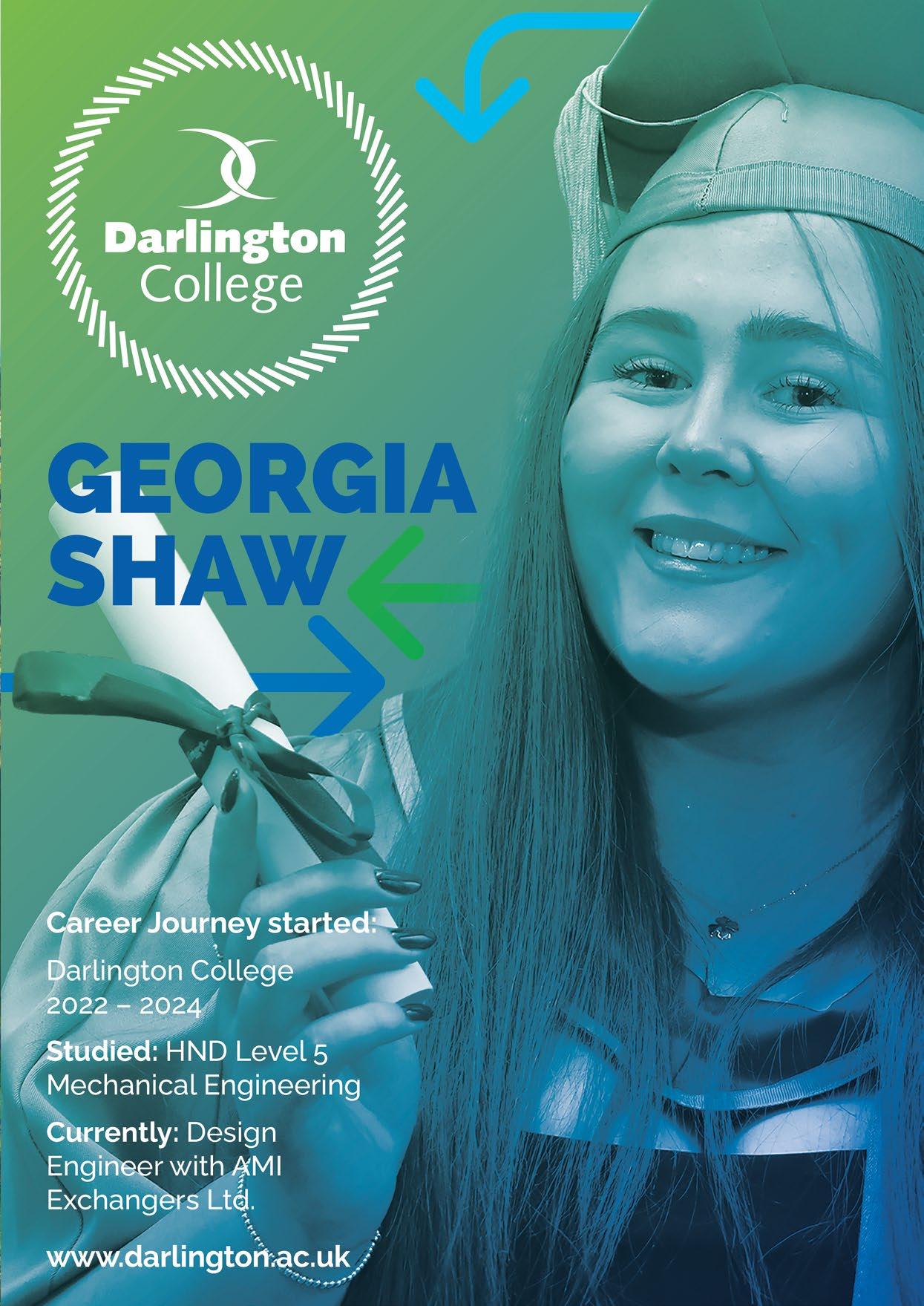

Art Workshops
Includes practical areas for fine art, photography and graphic design as well as studios to equip you with the skills needed in a modern workplace and our state-ofthe-art computing hardware and software will ensure you are trained with industry recognised equipment.
Business Gateway
Professional classroom, conferencing, and event spaces.
Childcare Centre
Our Childcare Centre provides a safe, nurturing, and stimulating environment for children to learn and grow. With experienced staff and the FAMLY app to keep parents connected, we ensure highquality care tailored to every child’s needs.
Food Court
Hungry? The Food Court offers a wide selection of hot and cold food, including healthy options.
Copy Shop
In-house printing facilities providing photocopying and stationery items for your everyday needs.
Elements Salon
Commercially run hair and beauty salons, fabulous treatments at brilliant prices. Call 01325 503030 for appointments.
Higher Education Centre
Higher Education students benefit from a flexible space away from other provision to study, learn and relax. There is a quiet space for assignment work and research to be carried out and other computer break out areas for group working.

The LRC provides access to books, DVDs, journals, Mac computers and other learning resources.
Media Centre Housing dedicated screening and games testing rooms, production studios and industry standard resources.
Railtown Coffee
Enjoy a tasty hot drink located in Central Point.
Sports Hall and Gym
Competitive sporting activities available daily in our fantastic sports halls. Fitness training sessions also run in our own newly refurbished college gym.
Student Services Centre
Course information, student support, admissions, careers guidance and student finance.
The Glasshouse Restaurant
A fine dining experience that is open to the public during term time for special themed evenings as well as lunch times, from Tuesday to Friday.
If your course runs in partnership with Teesside University you will have access to facilities at both Teesside University Darlington Campus and Darlington College. In addition, you will be able to access facilities at Teesside University’s Middlesbrough campus.
Darlington College is part of the Teesside University College Partnership (TUCP) which means that many of our higher education courses are delivered in partnership with the University.
Students on these courses can access services and facilities both at the College and the main Teesside University campus, these include information and advice, the careers service, library services, the Student Life building, Teesside University Students’ Union and disability services.
Studying one of our courses, delivered in partnership with Teesside University, will give you access to a wide range of student facilities at the University campus in Middlesbrough, including:
• The University’s Student Life building is a technologically-enabled environment, supporting a variety of learning styles, activities and attendance patterns. It offers a range of flexible spaces, enabling social and collaborative learning, as well as an information zone, consulting rooms and a cafe.
• Access to the University library, which is open 24/7 and offers flexible learning spaces to meet your needs from silent to group study.
• The chance to join the many clubs, societies and events taking place at Teesside University Students’ Union.
• Confidential counselling services.
• Teesside University Students’ Union Student Support, providing confidential and independent advice on housing, money, personal problems and more.
• Careers advice and enterprise opportunities. Find out more at. tees.ac.uk/studentlife
The TEF panel praised Teesside University across a multitude of different areas, including:
• Outstanding quality teaching, assessment and feedback.
• Extensive range of experimental learning opportunities.
• Commitment to staff professional development.
• Students’ contribution to shared ambition and course design.


Higher Education, Management and Professional Guide 2025-26
We can offer a wide range of support for Darlington College students with additional learning needs.
Support may include:
• Learning Support Assistants to support you in class
• Extra tuition through one-to-one and small group work
• Specialist support for specific learning difficulties such as dyslexia
• Support at break and lunch times
• Support to get around the college
• Help with personal care/medical needs
• Assistance if you have a sensory impairment
• Access arrangements for examinations/ assessments
For more information, please call 01325 503190 or email ALSTeam@darlington.ac.uk.

For students on a HE course with Teesside University at Darlington College, help and learning support can be accessed through Student Life online. There is a wealth of material and support available to you. Tutors/course leaders at Darlington College can arrange for their students to have library inductions and skills sessions with librarians from the University’s Student and Library Services Team.
Student Assistance Programme
Speak to a qualified counsellor 24/7 for help with:
• Stress and anxiety
• Housing and tenancy issues
• Relationship issues
• Mental health
• Money worries
• Family-oriented issues
Parents/carers studying a full or part time course at Darlington College have access to our Childcare offering exceptional care and education for children aged 6 weeks to 5 years in a safe, nurturing, and stimulating environment. Our dedicated and experienced staff provide tailored support to help each child thrive, while the FAMLY app keeps parents informed and engaged with their child’s development.
The centre is open Monday to Thursday from 8:00 am to 5:30 pm and Friday from 8:00 am to 5:00 pm, offering flexibility for busy families. To find out more, call us on 01325 503144.
We understand that there may be factors that can affect your progress and personal development whilst at college. This could be feeling extra pressure from your studies or coping with a personal issue. Whatever your worry may be, we can help you through our free and confidential counselling service. To book an appointment call 07483 088 300 or email srodgers@darlington.ac.uk.

Darlington College celebrates and values the diversity brought by all members of the college community and is committed to providing such services and support to enable all members of its community to achieve their full potential. The college aims to ensure that everyone is equally valued and treats one another with respect and dignity; seeking to provide a positive working and learning environment free from discrimination, harassment or victimisation.
To this end we seek to prevent behaviour which is not in line with the spirit of the college’s Equality and Diversity Policy. To view the full policy please visit our website www.darlington.ac.uk.
This publication is a general guide to college, our courses and facilities, and every effort is made to ensure complete accuracy. The college reserves the right to make changes to curricular content where appropriate. The information given in this publication does not impose on the college any obligation to provide, or continue to provide any courses, modules or amenities described. The college reserves the right to cease to run a programme if insufficient students enrol. However, as far as possible, the college will accommodate individual requirements.
Any information can be produced in other formats on request. Please contact our Marketing Team on 01325 503046.
If you have been out of education for a while you may not have the right entry qualifications to start on a higher education course, however, you may be able to study an Access course in order to progress onto a degree. Access courses are open to everyone over the age of 19, regardless of any previous qualifications. An Access course can be completed within one year and can be studied either during the day or evening. You may be eligible to apply for an Advanced Learner Loan to fund your Access course. Plus, if you go on to study at higher education level and you complete your degree then your Advanced Learner Loan will be written off.
For more information on our Access to Higher Education courses visit www.darlington.ac.uk or contact the Course and Information Team on 01325 503030.
We understand that you may have concerns about the cost of returning to education, so advice is available to help you find out whether you are eligible for help with your fees and how much your part time study will cost.
Financial support and advice
Fees Some of the Darlington College courses may qualify for an Advanced Learner Loan. Full details of all course fees or information regarding this loan are shown on our website www.darlington.ac.uk on each individual course. Registration, exam or membership fees may be payable as well. Full details are available online. More information on the Advanced Learner Loan can be found on www.gov.uk/advanced-learner-loan/overview or by calling 01325 503030.
Here is a typical example of loan repayments.
£28,000
£29,500
£31,000
£33,000
Scan the QR code to find out more about what funding support may be available to you.
If you are applying through Student Finance England for your student funding, the website for applications is www.gov.uk/student-finance.
Teesside University Welfare and Finance Advisers can be contacted on 01642 342277 or studentlife@tees.ac.uk
loans for Teesside
Those courses delivered in partnership with Teesside University are eligible for a student loan and display the Teesside University logo next to them. Loan repayments only start after you earn over the minimum income threshold. Repayments are based on what you earn, not on the amount borrowed.
After 40 years, any outstanding balance is written off.
Financial Support from Teesside University. A wide range of financial support is available for those who need additional help to fund their studies, in line with the University’s reputation for fair access.
£2,333
£2,458
£2,583
£2,750
Scan the QR code to find out more about Teesside University’s scholarships and bursaries offer.
£22
£33
£45
£60
Scan the QR code to find out more about Undergraduate student funding.
Asking your employer for support Employers may be able to pay part or all of your fees upfront. Your qualification will improve your ability to do your job, advance your career prospects, and your employer benefits from a better qualified and motivated employee. If your company doesn’t offer sponsored programmes, but you think further study would be beneficial to both parties, make a proposal to them. Initially talk to your line manager and be prepared to make a case to other senior staff or a personnel manager, who may make decisions on training expenditure. Alternatively use your appraisal as an opportunity to discuss doing a higher education course.
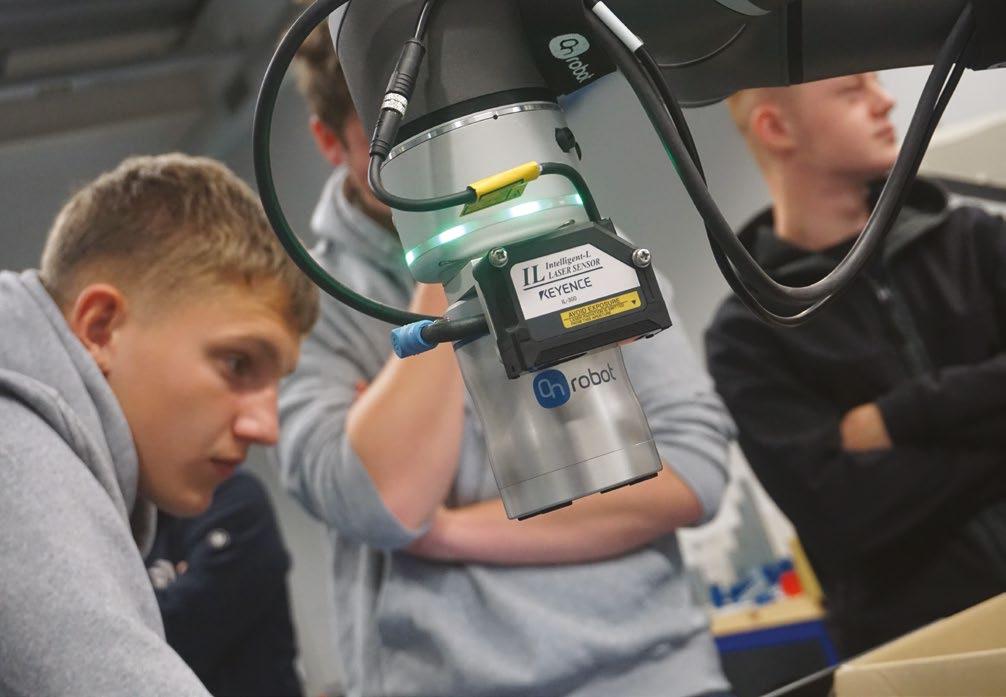
Working in partnership with Teesside University – many of our courses are accredited by the university, so whether you are looking to enhance your career prospects, study for a degree course or get back into education after a break, we have a course to suit you.
LEVEL 7
Post Graduate qualifications
Level 7 qualifications recognise highly developed, advanced and complex levels of knowledge which enable the development of in-depth and original responses to complicated and unpredictable problems and situations. Learning at this level involves the demonstration of high level specialist professional knowledge and is appropriate for senior professionals and senior managers. Level 7 qualifications are at a level equivalent to Masters degrees, postgraduate certificates and postgraduate diplomas.
LEVEL 6
Honours qualifications
Studying an honours qualification will allow you to develop a specialist, high level knowledge of an area of work, enabling you to use your own ideas and research in response to complex problems and situations. Level 6 qualifications are appropriate if you are working as a
knowledge-based professional or in a management position, e.g. Education and Training ProfGradCertEd, and Procurement and Supply Professional Diploma.
LEVEL 5
Higher qualifications
This level increases your depth of knowledge and understanding of an area of work or study, so you can respond to complex problems and situations. You will need a high level of work expertise and competence in managing and training others. These qualifications are appropriate if you are working as a higher grade technician, professional or manager, e.g. Business Management Foundation Degree, Mechanical Engineering HND and Counselling Foundation Degree.
LEVEL 4
Higher qualifications
This level of study involves specialist learning, including detailed analysis of a high level of information and knowledge in an area of work or study. They are appropriate if you are working in a technical or professional job, and/or managing and developing others, e.g. Accounting Diploma, Manufacturing Engineering HNC, Procurement and Supply Diploma.
You will need to apply through the Universities and Colleges Admissions Service (UCAS) for all full time foundation degrees or degree courses. Applications should be made as soon as possible. Late applications may result in you not getting a place on your first choice of course. Visit UCAS www.ucas.com or call 0371 468 0468.
At www.darlington.ac.uk all courses are listed under the subject areas. Click the relevant course title followed by the ‘Apply Now’ button. For further information on how to apply please contact Admissions – Call: 01325 503030 Email: admissionsandenquiries@darlington.ac.uk
Interview and offer Once your application has been received by the Admissions Department it will be sent to the appropriate
tutor for consideration. You will either then be invited in for an interview, or the tutor will call you to discuss your application and you will have the opportunity to ask any questions. Following this stage, you will be given a conditional offer based on you meeting the relevant entry criteria, including any references, or DBS checks (if required) and work placements.
During enrolment you must complete a Darlington College paper enrolment form. For Teesside University accredited programmes only, you must also complete Teesside University online enrolment on e-vision (a direct link will be emailed to you approximately 5 to 6 weeks before your course start date). If your employer is paying your course fees, you will need to provide a letter from them that states this when you enrol.
Course key: Examining Body | Attendance | Weeks | Duration | Level Course
Foundation Certificate In Accounting or Accounts/ Finance Assistant Apprenticeship
AAT | PT | 31 Weeks | 1 Year | Level 2

Advanced Diploma in Accounting or Assistant Accountant Apprenticeship
AAT | PT | 34 Weeks | 1 Year | Level 3

Grade C/4 in Maths or equivalent and an interview with the course tutor.
• Bookkeeping Transactions
• Bookkeeping Controls
• Elements of Costing
• Using Accounting Software
• Work Effectively in Finance
All of the units within the qualification are mandatory: Four units are assessed individually in end-of unit assessments, but this qualification also includes a synoptic assessment that students sat towards the end of the qualification. The synoptic assessment draws on and assesses knowledge and understanding from across the qualification.
This course can also be studied as an Accounts/Finance Assistant Apprenticeship.
To discuss class times and availability please contact professionalstudies@ darlington.ac.uk
AAT Accounting Certificate L2 or relevant L2 qualification in Business/Finance/ Accounting, or relevant work experience.
• Advanced Bookkeeping
• Final Accounts Preparation
• Management Accounting: Costing
• Indirect Tax
• Ethics for Accountants
• Spreadsheets for Accounting.
• Synoptic Assessment
All of the units within this qualification are mandatory. Four units are assessed individually in end of-unit assessments. This qualification also includes a synoptic assessment that students sit towards the end of the qualification, which draws on and assesses knowledge and understanding from across the qualification.
This course can also be studied as an Assistant Accountant Apprenticeship.
To discuss class times and availability please contact professionalstudies@ darlington.ac.uk
Professional Diploma in Accounting or Professional
Accounting Taxation Technicians Apprenticeship

Diploma in Accounting L3 or PE1 or equivalent of the senior accountancy qualifications or UK Accounting degree.
• Management Accounting: Budgeting
• Management Accounting: Decision and Control
• Financial Statements of Limited Companies
• Accounting Systems and Controls.
Plus two of the following Optional Units (to be discussed with your tutor);
• Business Tax
• Personal Tax
• External Auditing
• Cash and Treasury Management
• Credit Management.
This course can also be studied as an Professional Accounting /Taxation Apprenticeship.
To discuss class times and availability please contact professionalstudies@ darlington.ac.uk
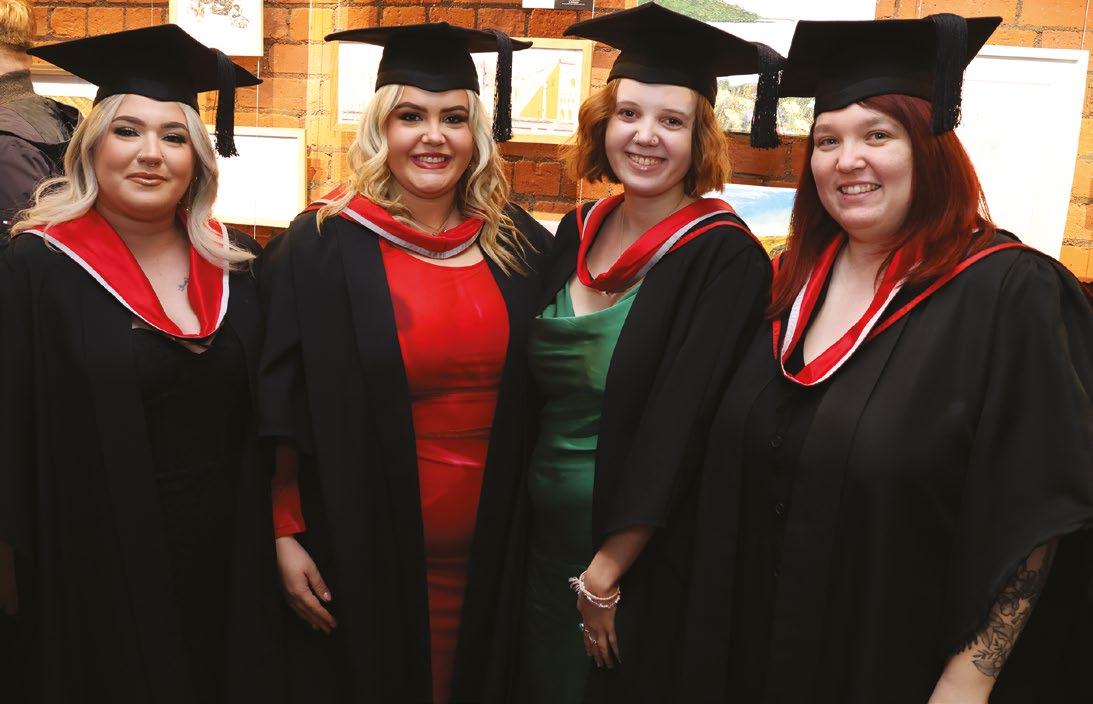
Course key: Examining Body | Attendance | Weeks | Duration | Level
Course Entry Criteria Course Content Assessment
Progression CMI Principles of Management and Leadership/Team Leading Apprenticeship
CMI | PT | 34 Weeks | 1 Year | Level 3

This qualification is suitable for learners who are in or aspiring to a team leader/ supervisor role. Learners will have English and Maths at Grade C/4 or above or Level 2. As a learner you will ideally be working within an organisation or role where you can demonstrate skills and apply knowledge. Alternatively, you could draw on previous experience within an organisation or use an organisation you are familiar with.
This qualification is aimed at practising or aspiring managers who will supervise or manage a team to achieve clearly defined outcomes. They will set and monitor goals and objectives by providing instruction, direction and guidance. Day to day operational and project activities are a key part of their role.
This course is assessed through coursework.
Possible modules on the course include:
• Principles of Management and Leadership
• Managing a Team to Achieve Results
• Building Stakeholder Relationships using Effective Communication
• Contributing to the Delivery of a Project
• Managing Daily Activities to Achieve Results
• Managing Budgets and Resources
• Managing Data and Information
• Managing Own Personal and Professional Development
This qualification can also be studied as a Team Leading Apprenticeship.
Assignments and module assessments are completed throughout the year. Continuous assessment means that you know how you are progressing and can talk about this to your tutor. The whole programme is externally assessed by the Institute to ensure national standards are maintained.
Progression onto the CMI Level 5 Diploma in Leadership and Management, or the Operations/ Department Manager Apprenticeship.
Business Management
Foundation Degree
TU | PT | 56 Weeks | 1-2 Years | Level 5 Level 3 qualification in appropriate subject.

Analysing financial information, strategic marketing, human resource management, work based development, change management, international business enterprise and entrepreneurship and project management.
Work based projects as well as written reports, essays and individual or group presentations.
TU course fees are payable to Teesside University and details of fees can be found on the Teesside University website www.tees.ac.uk. All courses are subject to viable numbers. Darlington College course fees are payable to Darlington College. Registration and membership fees may apply. All fees are per year. All courses are subject to viable numbers.
Progress to top up degree.
Course key: Examining Body | Attendance | Weeks | Duration | Level
Management and Leadership Diploma or Operations/ Department Manager Apprenticeship
CMI | PT | 34 Weeks | 1 Year | Level 5

This qualification is suitable for learners who are in or aspiring to a middle manager role.
Learners will have English and Maths at Grade C/4 or above or Level 2, and you will ideally be working within an organisation or role where you can demonstrate skills and apply the knowledge in the programme. Alternatively, you could draw on previous experience within an organisation or use an organisation you are familiar with.
Management training and development will help managers and aspiring managers to broaden their knowledge and understanding and more fully realise their management potential, enabling them to develop their career in their chosen field. Possible modules on the programme include:
• 501 Principles of Operational Leadership and Management in an Organisational Context
• 502 Principles of Developing, Managing and Leading Individuals and Teams to Achieve Success
• 509 Managing Stakeholder Relationships
• 513 Managing Projects to Achieve Results
• 514 Managing Change
• 515 Creating and Delivering Operational Plans
• 520 Managing Finance
• 525 Using Reflective Practice to Inform
• Personal and Professional Development
This qualification can also be studied as an Operations/Department Manager Apprenticeship. To discuss class times and availability please contact professionalstudies@ darlington.ac.uk
Assignments and module assessments are completed throughout the year. Continuous assessment means that you know how you are progressing and can talk about this to your tutor. The whole programme is externally assessed by the Institute to ensure national standards are maintained.
Leads onto a wide range of management careers or go onto the Strategic Management & Leadership L7.
Course key: Examining Body
Management and Leadership
CMI | PT | 34 Weeks | 1 Year | Level 7

L5 management qualification or equivalent, or management role or degree. You need to be working in a strategic leadership role within an organisation.
Management training and development will help you as a manager or an aspiring manager, to broaden your knowledge and understanding and fully realise your management potential to develop your career in your chosen field.
The course is delivered through monthly tutor led lectures, online resources, and tutorials.
In addition, you will be expected to devote a portion of time each week for self-directed study and/or assignment work.
• Unit 7021V1 Introduction to strategic management and leadership
• Unit 7004V1 Strategic information management
• Unit 7010V1 Implementing organisational change strategies
• Unit 7006V1 Reviewing organisational strategy plans and performance
• Unit 7022V1 Developing risk management strategies
To discuss class times and availability please contact professionalstudies@darlington.ac.uk
The Strategic Management and Leadership Level 7 is continuously assessed using work-based individual assignments, group case studies and group and individual presentations. There are no examinations or end point assessments involved in this programme of study.
Progress onto an MBA.

Course key: Examining Body | Attendance | Weeks | Duration | Level
| PT | 32 Weeks | 1 Year | Level 3

An interview with the course Tutor will take place, to ensure that this course is the right course for you.
Whilst there are no formal entry requirements for this course, it is helpful to have a C/4 grade, or equivalent in English to support your written assignment.
You’ll study 4 core units:
• Business, culture and change in context
• Principles of analytics
• Core behaviours for people professionals
• Essentials of people practice
Once you’re registered for a qualification, you’ll need to join the CIPD as a Student Member from the start of your studies. It’s essential to maintain your Student Membership until your studies are completed.
Your CIPD membership and qualification work together to ensure your knowledge is recognised both inside and outside the people profession. This course can also be studied as an HR Support Apprenticeship
There are 4 assignments to be completed during the course of the year, and a range of assessment methods will be used to validate the content and presentation of information in line with the CIPD assessment criteria.
Progression onto L5 Intermediate Diploma in Human Resource Management, and ultimately, the Advanced L7 Certificate, Diploma or MA in Human Resource Management.
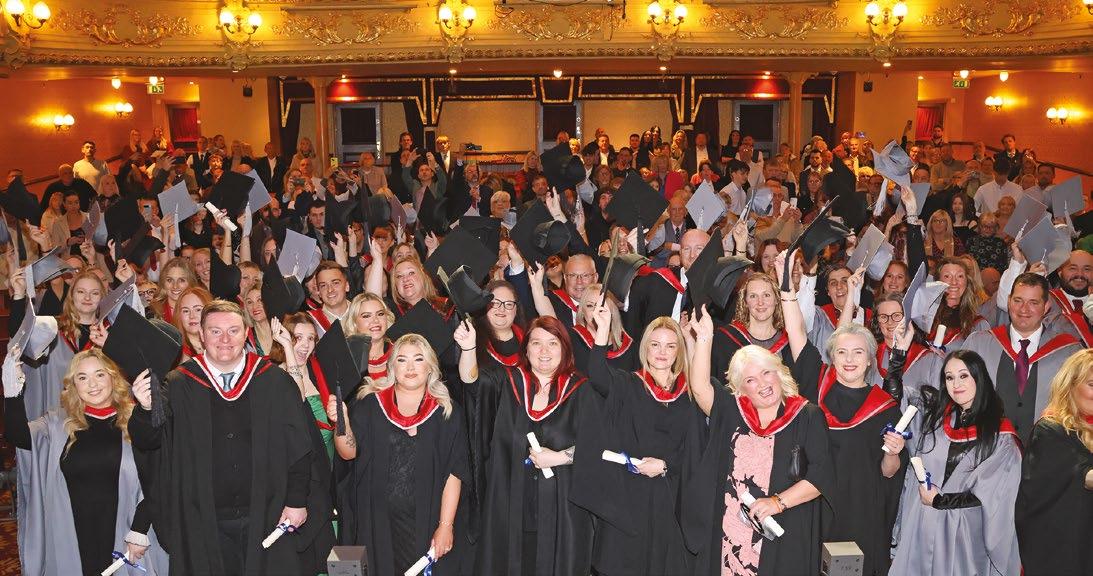
Course key: Examining Body | Attendance | Weeks | Duration | Level
Course
HR Apprenticeship Standard - HR Support
CIPD | FT | 104 Weeks | 2 Years | Level 3

To be in an HR role and have English and maths GCSE grade C/4 or above.
This programme is designed to support staff working in a HR role to gain the skills, knowledge and behaviour required to succeed in their organisation.
Typically, you will be working in a medium to large organisation, handling day to day queries and providing HR advice; working on a variety of HR processes ranging from transactional to relatively complex, from recruitment through to retirement; using HR systems to keep records; providing relevant HR information to the business; and working with the business on HR changes.
CIPD | PT | 32 Weeks | 1 Year | Level 5

An interview with the course Tutor will take place, to ensure that this course is the right course for you.
Experience in an HR role, or People Manager role at a middle manager level and ideally L3 Foundation qualification in Human Resource Practice are beneficial as a background for this programme. Academic writing is also required for the written content of this programme.
You’ll study 3 core units + 3 specialist units + 1 optional unit.
Core units:
• Organisational performance and culture in practice
• Evidence-based practice
• Professional behaviours and valuing people
Specialist units:
• Employment relationship management
• Talent management and workforce planning
• Reward for performance and contribution
Optional unit:
• Specialist employment law
Once you’re registered for a qualification, you’ll need to join the CIPD as a Student Member from the start of your studies. It’s essential to maintain your Student Membership until your studies are completed. Your CIPD membership and qualification work together to ensure your knowledge is recognised both inside and outside the people profession. This course can also be studied as a HR Consultant Apprenticeship.
• The L3 CIPD qualification will be a large portion of the assessment
• Workplace assessment to support development of behaviours and evidence gathering to support the rest of the standard.
• Supported by workplace mentor and line manager to provide development opportunities and support apprentice to successfully pass the EPA.
L5 CIPD qualification. L5 HR Consultant/ Partner Apprenticeship.
Formal written assignments, group and individual presentations, group feedback, case studies and question and answer sessions.
The Advanced L7 Certificate, Diploma or MA in Human Resource Management.
Course key: Examining Body | Attendance | Weeks | Duration | Level
People Professional Apprenticeship
CIPD | FT | 104-156 Weeks | 2-3 Years | Level 5

L3 HR Support Apprenticeship or relevant experience. Maths and English at Grade C/4 or above.
This programme is designed to support staff working as a HR consultant, a HR business partner, or a similar role to gain the skills, knowledge and behaviour required to succeed in their organisation.
Learners will gain a good grounding across the whole range of HR disciplines as this is contained in both of the qualification options included in this standard. You will often be required to make decisions and recommendations on what the business can/ should do in a specific situation.
You will be influencing managers to change their thinking as well as bringing best practice into the organisation.
• The L5 CIPD HR Management qualification will be a large portion of the assessment
• Workplace assessment to support development of behaviours and evidence gathering to support the rest of the standard.
• Supported by workplace mentor and line manager to provide development opportunities and support apprentice to successfully pass the EPA.
Procurement and Supply Advanced Certificate/ Procurement and Supply Assistant Apprenticeship
CIPS | PT | 37 Weeks | 1 Year | Level 3
An interview with the course Tutor will take place, to ensure that this course is the right course for you. It is helpful to have a C/4 grade, or equivalent in English to support your written assignments.
Elective units Procurement and supply Environments or Sustainable and ethical warehousing.
Ethical Procurement and Supply, Contract Administration, Team Dynamics and change, Socially Responsible Procurement.
They are externally set and marked examinations for each of the five subjects.
TU course fees are payable to Teesside University and details of fees can be found on the Teesside University website www.tees.ac.uk. All courses are subject to viable numbers. Darlington College course fees are payable to Darlington College. Registration and membership fees may apply. All fees are per year. All courses are subject to viable numbers.
Course key: Examining Body | Attendance | Weeks | Duration | Level
Course
Procurement and Supply Diploma or Commercial Procurement and Supply Apprenticeship
CIPS | PT | 40 Weeks | 1 Year | Level 4
An interview with the course Tutor will take place, to ensure that this course is the right course for you.
A minimum of at least two A-levels (or international equivalent) or a CIPS Level 3 Advanced Certificate qualification is required. Alternatively, you will need a minimum of two years’ relevant experience in a business environment.
Developed using the Procurement Cycle as its focus, you will:
• Learn about the core principles, concepts and practical applications when procuring goods or services.
• Gain essential knowledge and practical skills in contracting, negotiation, supplier relationships, ethics and asset management.
• Understand how procurement fits within the rest of your organisation and how it can help to shape key future business decisions.
Based at the same level as a first year of an undergraduate degree course, you will be equipped with essential knowledge and tools that you can apply immediately in your workplace.
This is the highest entry point onto our diploma qualifications.
Units of study are:
• Scope and influence of supply
• Business needs
• Commercial contracts
• Ethical Sourcing
• Commercial Negotiations
• Relationship Management
• Whole life asset management
• Procurement and supply in practice
Assessment of each unit will be an exam and there are six opportunities to sit exams throughout the year.
Progression onto L5.
Procurement and Supply Advanced Diploma
CIPS | PT | 40 Weeks | 1 Year | Level 5
An interview with the course Tutor will take place, to ensure that this course is the right course for you.
Building on the practical knowledge and understanding gained at the CIPS Level 4 Diploma in Procurement and Supply, your learning will focus on:
• Key aspects of risk in supply chains and mitigation of those risks.
• Processing and evaluating contracts.
• Understanding the impact of legal implications when contracts are breached.
• The different approaches to managing teams and individuals.
• Sustainability and the managerial approaches that promote ethical practices.
Managing teams and individuals
• Managing supply chain risk
• Managing contractual risk
• Advanced Contract and Financial Management
• Managing Ethical Procurement and supply
• Category Management
• Project and change management
Progression onto L6.
Course key: Examining Body | Attendance | Weeks | Duration | Level
Procurement and Supply Professional Diploma
CIPS | PT | 40 Weeks | 1 Year | Level 6
An interview with the course Tutor will take place, to ensure that this course is the right course for you.
CILT | FT | 120 Weeks | 2-5 Years | Level 3

You will need to be employed in a suitable role and generally will be expected to have 5 GCSEs at grade 4 or above.
This qualification will help you make a real impact in your career. It is recognised by employers world-wide for producing competent and confident procurement and supply professionals, capable of guiding and leading their organisations to sustainable success. Your learning will focus on:
• Delivering effective and efficient procurement and supply strategies that enhance an organisation’s prospects for long-term financial stability and longerterm success.
• Development, configuration and implementation of global commercial strategy to achieve competitive advantage.
• Evaluating the influence of strategic supply chain management and assessing the methods that are available to measure, improve and optimise supply chain performance.
This apprenticeship will introduce you to the skills, knowledge and behaviours required in the entire supply chain. As part of this apprenticeship you will study an operations management qualification.
Strategic Ethical Leadership
• Global Commercial Strategy
• Global strategic supply chain management
• Future Strategic Challenges of the profession
• Strategic programme leadership
• Innovation in procurement and supply
• Global logistics strategy
Each of the modules will be assessed by an exam. Exams are a mixture of objective response and constructive response. There are 6 opportunities throughout the year to take an exam.
Transfer to further degree and/ or postgraduate management courses.
End point assessment methods include a written knowledge test, a workplace project and presentation and a professional dialogue and interview.
You can progress from this to further management study or to a project management qualification
TU course fees are payable to Teesside University and details of fees can be found on the Teesside University website www.tees.ac.uk. All courses are subject to viable numbers. Darlington College course fees are payable to Darlington College. Registration and membership fees may apply. All fees are per year. All courses are subject to viable numbers.
Course key: Examining Body | Attendance | Weeks | Duration | Level
Associate Project Manager
Apprenticeship
Association of Project Managers | PT | 34 Weeks | 1 Year | Level 4

Level 3 qualification, 5 GCSEs including Maths and English Level 4/ C grade.
The course follows the life cycle through project initiation, project planning and delivery of a project. This course is aimed at those wishing to achieve a broad level of project management knowledge sufficient to participate in a range of projects.
Units of study are:
• Project environment, life cycle & roles
• Stakeholder engagement
• Project management plans
• Risk & Issue Management
• Procurement
• Quality Management
• Conflict & negotiation
• Schedule and resource optimisation
Assessment is one exam awarding the project management qualification. You can progress from this to further management study or to a project management qualification.
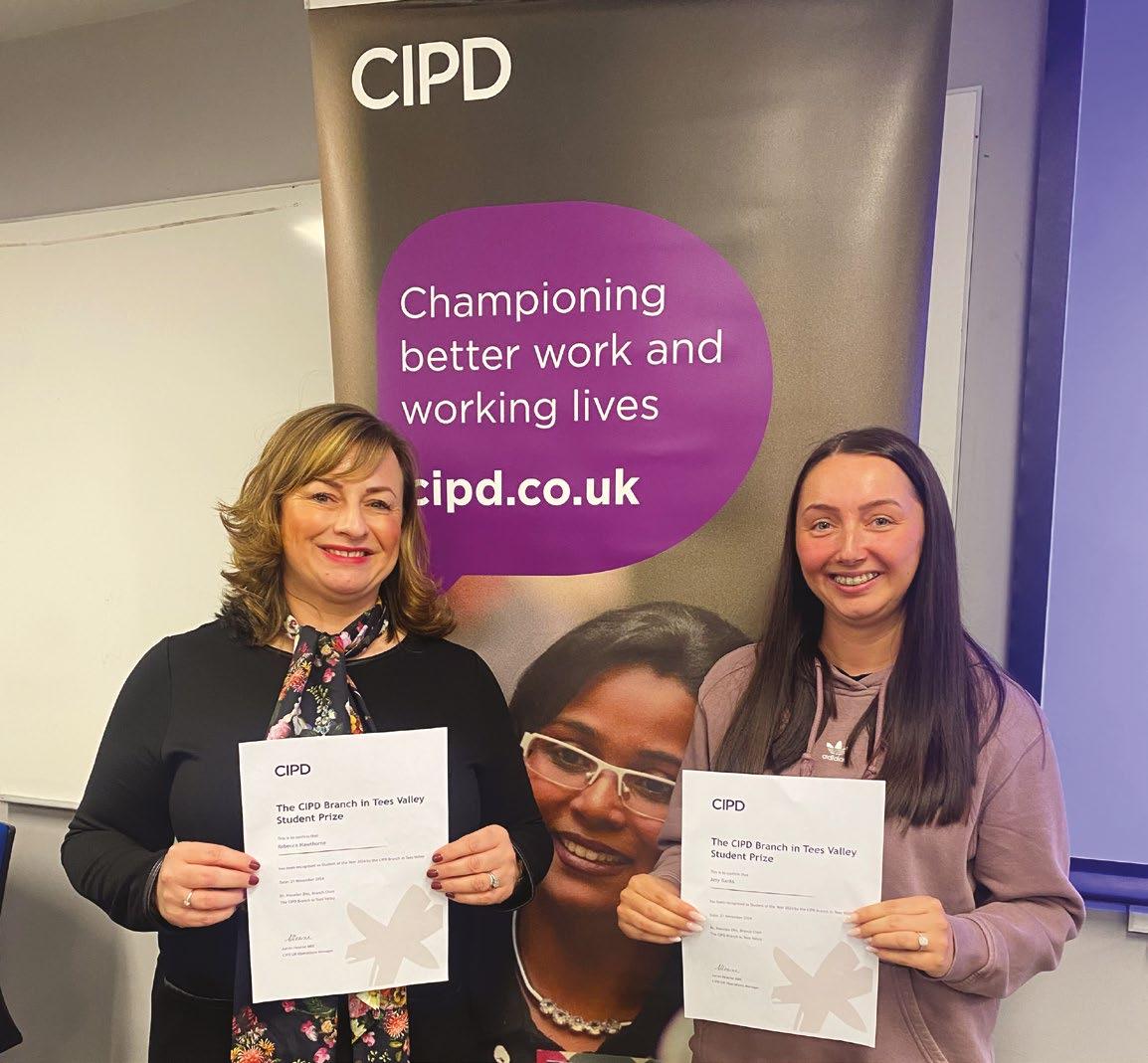
Amy Banks and Rebecca Illes were awarded the CIPD Level 5 Students of the Year 2024 at a presentation at Teesside University.
Level 5 Foundation Degree Hospitality and Tourism Management

For entry to level 4/ year one, applicants must: be 18 years or over by 31 December in their first year of study have a Level 3 qualification – such as;
• Diploma in Professional Cookery (with pass grade of 60 credits or more)
• NCFE Introductory Diploma in Travel & Tourism with a merit grade or above
• Level 3 Extended Diploma in Travel & Tourism with a pass grade
• Or a Business management equivalent qualification at level 3
• Or a minimum of 2 years’ relevant industry experience For entry to level 5/ year two, applicants must have: 120 credits at level 4 in a Hospitality/ Tourism qualification or equivalent.
Attend a professional discussion prior to joining the programme to explore Recognition of Prior Learning (RPL).
The course provides an academic award in the study of hospitality and tourism in both a vocational and academic environment. Through a programme of seminars, lectures, practical sessions, guest lecturers, masterclasses and course related study trips and visits this industry relevant programme facilitates inter professional education and working. You will expand your knowledge and skills through a range of core and optional modules that develop your knowledge and understanding. The learning and teaching are designed to encourage a progressive acquisition of subject knowledge and skills throughout the two-year programme.
The FdA in Hospitality & Tourism Management programme is multidisciplinary in its make-up, incorporating a range of theory and practice assessments and business and management influences which ensure the variety of the learning opportunities and experiences the programme offers. Small group class sizes, with a personal tutor to assist you in all elements of learning throughout the 2yr course. You will be taught by industry professionals alongside highly skilled and experienced senior lecturers with a mixture of lectures, seminars, workshops and practical learning offered to ensure your achievement. Alongside contact tutor hours you will also be required to research and study independently. You will be offered course related visits and an opportunity to participate in work placements.
A variety of assessment methods are used to enhance your experience and ensure you develop key transferable skills.
Formative feedback will be given throughout the course. You will be assessed through coursework designed to demonstrate your ability to meet the learning outcomes of the course.
Assessments will include, presentations, posters, assignments, portfolios, practical assessments and exams.
On successful completion of the course students will be appropriately placed and equipped with the necessary academic tools, professional skills and knowledge and personal and transferable skills to compete for junior management positions within the industry.
Course key: Examining Body |
HNC Building Studies
TU | PT | 60 Weeks | 2 Years | Level 4

Level 3 qualification within a construction related subject, or 1 A Level in an appropriate subject.
Relevant industrial experience will also be considered.
Mechanical Engineering
TU | PT | 60 Weeks | 2 Years | Level 4

Level 3 Diploma in Engineering or a related subject and GCSE Grade 4+ in Maths and English. Applicants should also be able to demonstrate Level 3 Maths (via a maths A level or an Engineering Maths unit achieved within their diploma or extended diploma).
This must include calculus.
The programme looks at all aspects of construction, including management principles, site surveying, building technology and materials, and how these elements come together to provide both commercial and residential buildings. It explores both the construction of new properties and the adaptation and refurbishment or restoration of existing buildings. The course is designed for technicians in architecture, site/building management, quality surveying, and building surveying to name a few along with being suitable for many career paths within construction and allied professions.
This professional qualification is delivered in partnership with Teesside University, based at the Darlington College campus. The programme provides a nationally recognised qualification offering opportunities for career progression and professional development for students in employment.
This qualification is also a wellestablished direct-entry route to Year 2 of BEng (Hons) or onto our HND Level 5 Engineering courses. These programmes are recognised for their vocational nature and the inherent flexibility which allows the programmes to be tailored to meet local industry requirements.
The programmes are designed using core modules to provide underpinning knowledge and elective modules to allow for flexibility in training needs. The syllabus covers subject engineering topics such as Design, Maths, Engineering Science, Engineering Materials, Pneumatics & Hydraulics, Thermo & Heat Engines and also Mechanical Principles.
By formative and summative assessments, including coursework assignments, end exams, phase tests and group presentations.
Full or part time degree, e.g. (BS) Hons Architectural Technology, BSc (Hons) Construction Management, BSc (Hons) Quality Surveying, BEng (Hons) Civil Engineering or CIOB.
Formative and summative assessment (including coursework assignment, endpoint exams, phase tests and group presentations).
Progression onto the HND Mechanical Engineering course here at Darlington College or into Engineering based industry.
TU | PT | 60 Weeks | 2 Years | Level 4

Level 3 Diploma in Engineering or a related subject and GCSE Grade 4+ in Maths and English.
Applicants should also be able to demonstrate Level 3 Maths (via a maths A level or an EngineeringMaths unit achieved within their diploma or extended diploma). This must include calculus.
This professional qualification is delivered in partnership with Teesside University, based at the Darlington College campus. The programme provides a nationally recognised qualification offering opportunities for career progression and professional development for students in employment.
This qualification is also a wellestablished direct-entry route to Year 2 of BEng (Hons) or onto our HND Level 5 Engineering courses.
These programmes are recognised for their vocational nature and the inherent flexibility which allows the programmes to be tailored to meet local industry requirements.
The programmes are designed using core modules to provide underpinning knowledge and elective modules to allow for flexibility in training needs. The syllabus covers subject Engineering topics such as Design, Maths, Engineering Science, engineering materials, Pneumatics & Hydraulics, Digital & Analogue Circuits, Mechatronic System Principles and Programmable Logic Controllers (PLCs).
Formative and summative assessment (including coursework assignment, endpoint exams, phase tests and group presentations). Progression onto the HND Mechanical Engineering course here at Darlington College or into Engineering based industry.
TU course fees are payable to Teesside University and details of fees can be found on the Teesside University website www.tees.ac.uk. All courses are subject to viable numbers. Darlington College course fees are payable to Darlington College. Registration and membership fees may apply. All fees are per year. All courses are subject to viable numbers.
Course key: Examining Body |
TU | PT | 60 Weeks | 2 Years | Level 5

Level 4 HND Engineering related subject and GCSE Grade 4+ in Maths and English.
This professional qualification is delivered in partnership with Teesside University, based at the Darlington College campus. The programme provides a nationally recognised qualification offering opportunities for career progression and professional development for students in employment. Completion of the HND opens up the opportunity to progress with advanced standing on to an appropriate degree programme.
These programmes are recognised for their vocational nature and the inherent flexibility which allows the programmes to be tailored to meet local industry requirements. The programmes are designed using core modules to provide underpinning knowledge and elective modules to allow for flexibility in training needs. The syllabus covers subject Engineering topics such as Engineering Management, Further Maths, Sustainability, Lean Manufacturing, Virtual Engineering, Measurement & Testing and also Advance Mechanical Principles.
Formative and summative assessment (including coursework assignment, endpoint exams, phase tests and group presentations). HND can progress into an Honours Degree or into Engineering based industry.

Course key: Examining Body | Attendance | Weeks | Duration | Level
Course
Journalism Diploma or NCTJ Journalism Apprenticeship
NCTJ | PT | 34 Weeks | 1 Year | Level 5

Level 4 Foundation Diploma in Art and Design - Interactive Arts
UAL | FT | 35 Weeks | 1 Year | Level 4

5 GCSEs (grade C/4 or above, including English) or 2 A Levels or equivalent vocational qualification.
NQJ Community Reporter Senior Programme/ Senior Reporter Apprenticeship
NCTJ | PT / Distance Learning | Various | Various | Level 6

It is recommended that students have a minimum of 5 × GCSEs at grade 4 or grade C, including Maths and English (to be discussed at interview), and one A level, or equivalent Level 3 qualification, preferably in a relevant creative subject or accompanied by a portfolio of work.
You will be equipped with the professional qualification and practical skills that are essential for anyone seeking employment in a multimedia setting, which could include print journalism, writing for websites, public relations and broadcast media.
Course subject to viable numbers. This can also be done as a Trainee Journalist Apprenticeship.
The UAL Level 4 Foundation Diploma in Art and Design is a pivotal qualification which provide a transition from general education to specialist art and design education. The course is also designed to support adults who wish to return to full-time education and allows students to make an informed decision when applying to Higher Education or seeking employment within a related industry.
The programme therefore builds on students’ prior experience, linking skills already acquired with ideas and challenges, which will increase their independence and enable them to demonstrate a full understanding of the relevant standards necessary to progress to Higher Education or to an alternative career path.
NCTJ Diploma. Part of a new Community News Project between Facebook, The National Council for the Training of Journalists (NCTJ) and regional publishers.
As well as a programme of digital training led by Facebook, journalists will receive training towards the NCTJ qualification in Darlington and through distance learning.
Completion of self-study outside college hours. Progression onto the NQJ examinations.
Coursework and portfolio based formative and summative assessment throughout the year including written assignments, live assignments, exhibitions, presentations and group critiques. No exams.
Higher Education or seek employment/ selfemployment in a relevant industry.
Exams and Logbook.
Senior Reporter: Increased responsibility, leading investigations, mentoring.
Specialist Reporter: Focus on specific areas (e.g., politics, business, sports).
News Editor: Oversee news production, assign stories, manage teams.
Freelance Journalist: Work independently for various outlets.
Public Relations: Utilize journalism skills in a public relations role.
TU course fees are payable to Teesside University and details of fees can be found on the Teesside University website www.tees.ac.uk. All courses are subject to viable numbers. Darlington College course fees are payable to Darlington College. Registration and membership fees may apply. All fees are per year. All courses are subject to viable numbers.
Course key: Examining Body | Attendance | Weeks | Duration | Level
Course Entry Criteria Course Content
Foundation Degree Early Years Sector Endorsed
TU | PT | 56 Weeks | 2 Years | Level 5

Relevant L3 early years or childcare qualification, ideally with GCSE maths and English. Working in a relevant setting with children aged 0-8 years of age for at least one day per week paid or voluntary. Requires enhanced DBS.
This programme is an excellent progression for those wanting to enhance their knowledge and employability in the early years sector.
Progression opportunities from this course can also enable learners to go into teaching. It is suitable for practitioners working in all early years settings including nurseries, schools and playgroups.
Modules include:
• Child Development,
• Policy in Early Years,
• Play and Active Learning
• Protecting Children and modules linked to your placement.
Please note modules are subject to change.
Assessment
Through coursework which may include essays, reports, case studies, research reports and portfolio work and professional accreditations/ placements.
Progression
Progression onto the BA (Hons) Childhood Studies (Top-up) Online and BA (Hons) Education & Training.
Foundation Degree Working with Children and Young People
TU | PT | 56 Weeks | 2 Years | Level 5

“I really enjoy the college and this course; I think the lecturers are really motivating and inspiring and I would recommend this to anyone…” PGCE student
Relevant L3 qualification and experience of working with children and young people. Ideally you will have GCSE maths and English. Working in a relevant setting with children or young people from 5-25 years of age at least one day a week paid or voluntary. Requires enhanced DBS.
An excellent progression for those working with children and young people who are wanting to enhance their knowledge and employability, or want to progress into the teaching profession.
Modules include:
• Developing work based learning,
• Safeguarding
• Childhood and Youth Development
• Understanding Learning for Inclusive Practice Skills,
• Relationship building and effective communication.
Please note modules are subject to change.
Through essays, reports, annotated bibliographies, discussions, portfolios of evidence and presentations.
Progression onto the BA (Hons) Childhood Studies (Topup) Online and BA (Hons) Education & Training.
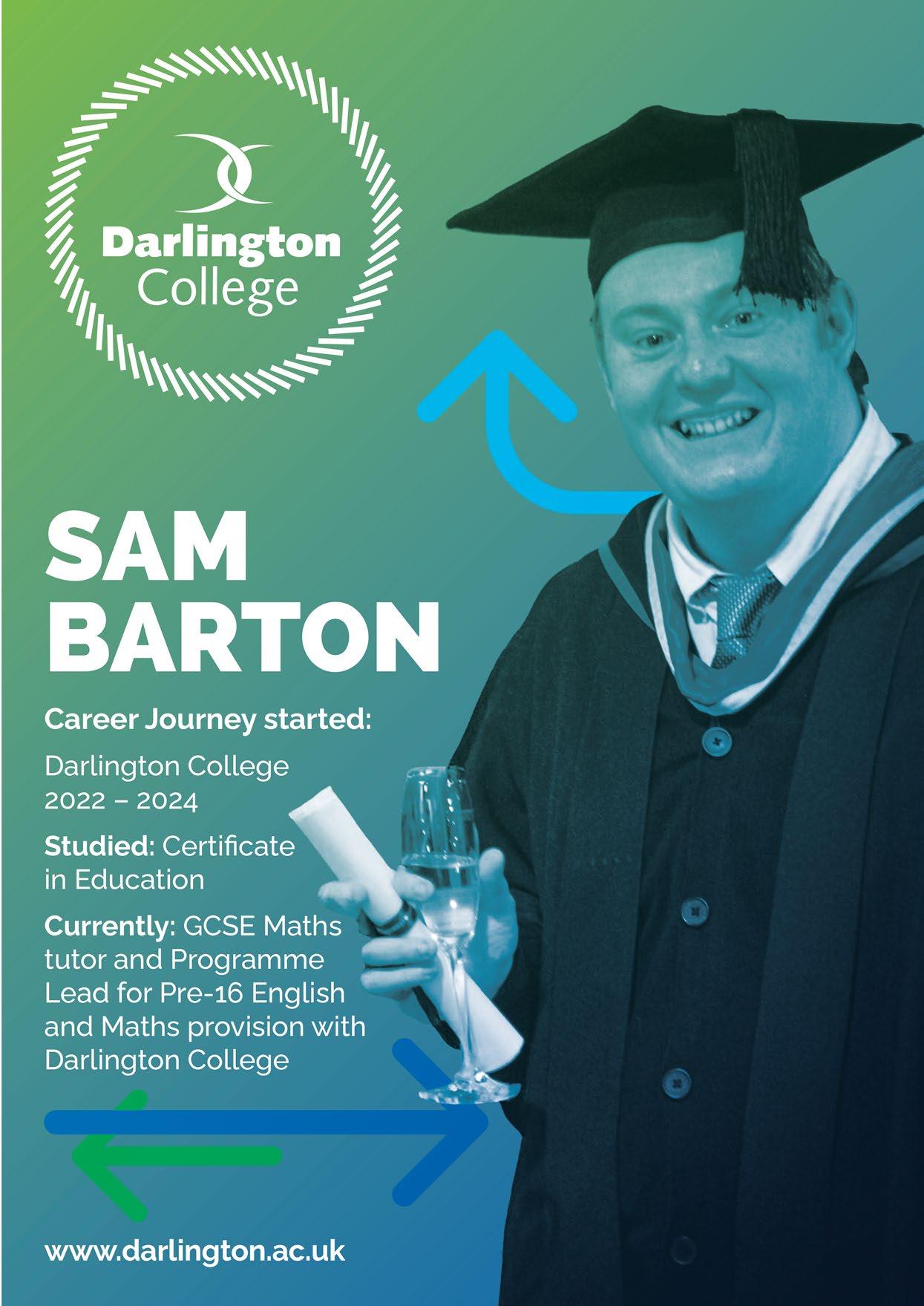
Course key: Examining Body
TU | FT | 29 Weeks | 1 Year | Level 6

A minimum of a degree in your subject specialism, GCSE at grade C/4 or above in English (or equivalent), a placement that will supply 100 hours of teaching. *subject to changes in DFE requirements.
The full-time programme is a preservice award for those intending to teach in the sector.
You study a range of modules that takes you from preparing to teach through to more advanced practice skills. You also study issues affecting the education and training educational sector, such as educational policy, quality assurance, and your own personal and professional development needs. All programmes are mapped to the relevant occupational standardsProfessional Standards for Teachers and Trainers in Education and Training – England (The Education and Training Foundation) which are referred to throughout your progression through the programme.
Core modules:
• Developing Learning and Teaching
• Enhancing Learning and Teaching
• Evidence Informed Learning and Teaching
• Thinking in Learning and Teaching
TU | PT | 29 Weeks | 2 Years | Level 6

For direct entry into the 1-year route, entrants will be expected to have attained a foundation degree or equivalent (120 credits at Level 4 and 120 credits at Level 5) in a relevant and appropriate educational area.
For direct entry into the 2-year route, entrants will be expected to have attained 120 credits at Level 4 in a relevant and appropriate educational area (such as a Certificate in Education, lifelong learning, DTLLS or NVQ 4 in learning and development). Applicants must be in paid or unpaid employment in an educational practice for at least 2-5 hours per week.
The programme aims to help lecturers, mentors, teaching assistants and other workers in education develop their knowledge of educational practice and reflect on strategies for developing their professional practice. It is primarily for those currently practicing or volunteering in the sector.
A range of modules are offered which explore the psychology of education, contexts and practice, learning environments and inclusive practice. The final year offers the chance to explore the curriculum in more depth and carry out a substantial project based in your practice.
A combination of written assessments, reflective teaching journals and teaching portfolios, and by observations of your teaching practice.
Completion of the full certificate will enable you to apply for QTLS status.
Evaluative reflective commentaries, evaluative reports, critiques or research papers, individual presentations, student led seminars, action research, practice portfolios, a practitioner handbook, essays, case studies and work products such as learning and teaching materials. Students will also produce a research proposal and a dissertation.
On completion of the full degree you may be able to apply for relevant Master’s level programmes.
Course key: Examining Body | Attendance | Weeks | Duration | Level
Course
City & Guild | PT | 29 Weeks
1 Year | Level 3

You must hold relevant occupational qualifications and experience and be working with an assessment centre who will provide you the opportunities to assess 2 learners across a range of assessment methods.
This course is intended for those who assess both occupational competence in the work environment and vocational skills, knowledge and understanding.
• Unit 01 Understanding the principles and practices of assessment
• Unit 02 Assess occupational competence in the work environment
• Unit 03 Assess vocational skills, knowledge and understanding
The first unit is Understanding the Principles and Practices of Assessment which is a theory based unit. You will be provided with reading material to support your learning. The other 2 units will be evidence based from your assessments of the 2 learners.
Tutorials will be offered to support you.
City & Guild | PT | 29 Weeks
1 Year | Level 4

This course is assessed by completing a portfolio of evidence to meet the criteria for the 3 units included in this course.
Once you have become an experienced assessor you may consider becoming an Internal Quality Assurer, or progressing to the Teesside University Level 4/5 Certificate in Education: Education and Training.
“This is an excellent course. I feel extremely well supported and certainly challenged (in a good way!)” PGCE student
You must hold relevant occupational qualifications and experience and be working with an assessment centre or organisation which is able to provide opportunities for a you to demonstrate performance in assuring the quality of assessment.
Learners need to have achieved a Level 3 qualification.
This qualification is intended for those who maintain and improve the quality of assessment from within an organisation or assessment centre. The qualification comprises of two units:
• Unit 01 : Understanding the principles and practices of internally assuring the quality of assessment.
• Unit 02: Internally assure the quality of assessment.
The first unit is Understanding the principles and practices of internally assuring the quality of assessment which is a theory based unit.
You will be provided with reading material to support your learning. The other unit will be evidence based from your assessments of learners. Tutorials will be offered to support you.
This course is assessed by completing a portfolio of evidence to meet the criteria for the 2 units included in this course.
Learners who achieve these qualifications could progress to the Teesside University Level 4/5 Certificate in Education: Education and Training.
TU course fees are payable to Teesside University and details of fees can be found on the Teesside University website www. tees.ac.uk. All courses are subject to viable numbers. Darlington College course fees are payable to Darlington College. Registration and membership fees may apply. All fees are per year. All courses are subject to viable numbers.
Course key:

Level 3 or equivalent in your subject specialism, GCSE at grade C/4 or above in English (or equivalent), a placement that will supply 40 hours of teaching in the first year and 60 hours in the second.
The full-time programme is a preservice award for those intending to teach in the sector.
*subject to changes to DFE requirements
You study a range of modules that takes you from preparing to teach through to more advanced practice skills. You also study issues affecting the education and training educational sector, such as educational policy, quality assurance, and your own personal and professional development needs.
All programmes are mapped to the relevant occupational standardsProfessional Standards for Teachers and Trainers in Education and Training – England (The Education and Training Foundation) which are referred to throughout your progression through the programme.
Core modules:
• Developing Learning and Teaching
• Enhancing Learning and Teaching
• Evidence Informed Learning and Teaching
• Thinking in Learning and Teaching
A combination of written assessments, reflective teaching journals and teaching portfolios, and by observations of your teaching practice.
Completion of the full certificate will enable you to apply for QTLS status.
TU course fees are payable to Teesside University and details of fees can be found on the Teesside University website www. tees.ac.uk. All courses are subject to viable numbers. Darlington College course fees are payable to Darlington College. Registration and membership fees may apply. All fees are per year. All courses are subject to viable numbers.
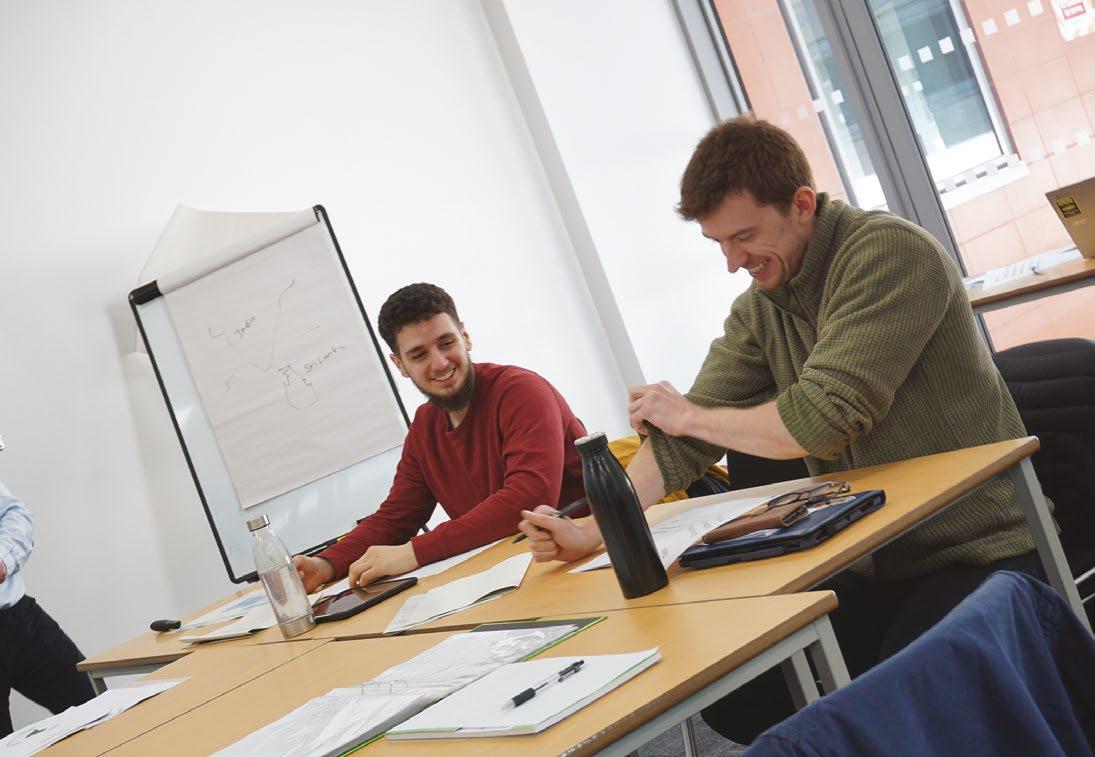
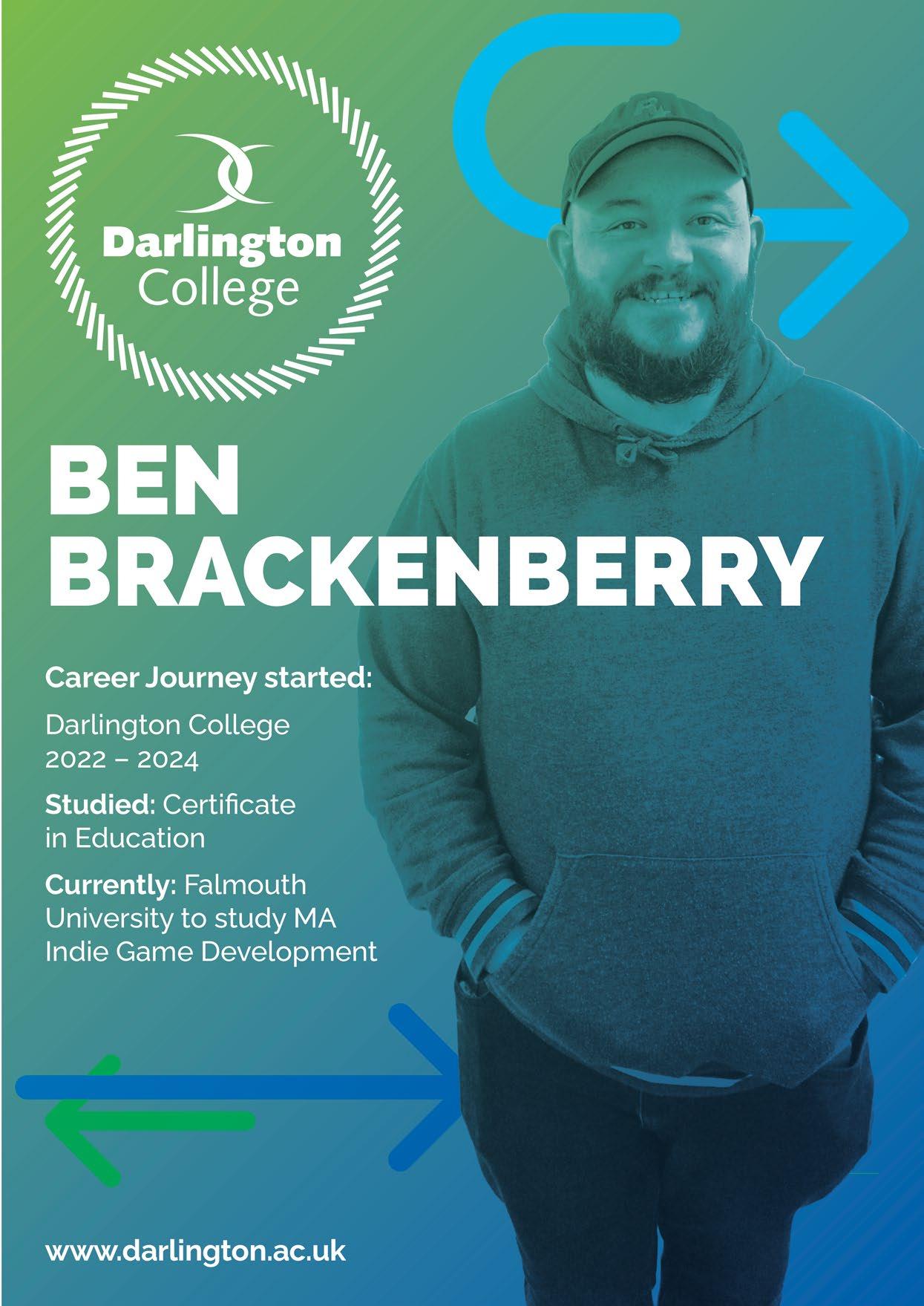
Course Entry
Foundation Degree in Counselling
TU | PT | 84 Weeks | 3 Years | Level 5

L3 (NQF) or equivalent counselling training. You are required to have GCSE grade C/4 in English. Prior to commencing the course, you are required to apply for Disclosure and Barring Services (DBS).
This course is provided on a parttime basis over three years, with attendance of one day each week, during the academic year. It provides a high level of professional training in counselling, through which you will acquire both a sound theoretical framework and the practitioner skills. These are required to enable you to work safely and effectively as a counsellor. The core model of the course is the PersonalCentred Approach, with aspects of psychodynamic, cognitive behaviour and integrative approaches explored as comparisons.
You will be required to undertake a minimum of 100 hours supervised clinical practice with a recognised counselling agency (over years two and three of the course) and undertake a minimum of 20 hours of personal therapy (over the duration of the course). You shall be expected to attend four mandatory weekend workshops over the duration of the course, for which there shall be an additional charge.
The course is subject to viable numbers, for it to be delivered.
To achieve the Foundation Degree you will need to demonstrate both academic and clinical competence. This is achieved through a variety of written academic assignments, oral presentations, observation and reflection of practice, together with records of supervised clinical practice within a counselling agency and completion of individual personal therapy.
BA (Hons) in Therapeutic Counselling or BACP accreditation. CPCAB Level 5 in CBT Theory and skills.

Foundation Degree in Counselling
TU | PT | 56 Weeks | 2 Years | Level 5

BA (Hons) in Therapeutic Counselling or BACP accreditation. CPCAB Level 5 in CBT Theory and skills. Course key: Examining Body
L3 (NQF) or equivalent counselling training. You are required to have GCSE grade C/4 in English. Prior to commencing the course, you are required to apply for Disclosure and Barring Services (DBS).
This course is provided on a parttime basis over three years, with attendance of one day each week, during the academic year. It provides a high level of professional training in counselling, through which you will acquire both a sound theoretical framework and the practitioner skills. These are required to enable you to work safely and effectively as a counsellor. The core model of the course is the PersonalCentred Approach, with aspects of psychodynamic, cognitive behaviour and integrative approaches explored as comparisons.
You will be required to undertake a minimum of 100 hours supervised clinical practice with a recognised counselling agency (over years two and three of the course) and undertake a minimum of 20 hours of personal therapy (over the duration of the course). You shall be expected to attend four mandatory weekend workshops over the duration of the course, for which there shall be an additional charge.
The course is subject to viable numbers, for it to be delivered.
To achieve the Foundation Degree you will need to demonstrate both academic and clinical competence. This is achieved through a variety of written academic assignments, oral presentations, observation and reflection of practice, together with records of supervised clinical practice within a counselling agency and completion of individual personal therapy.
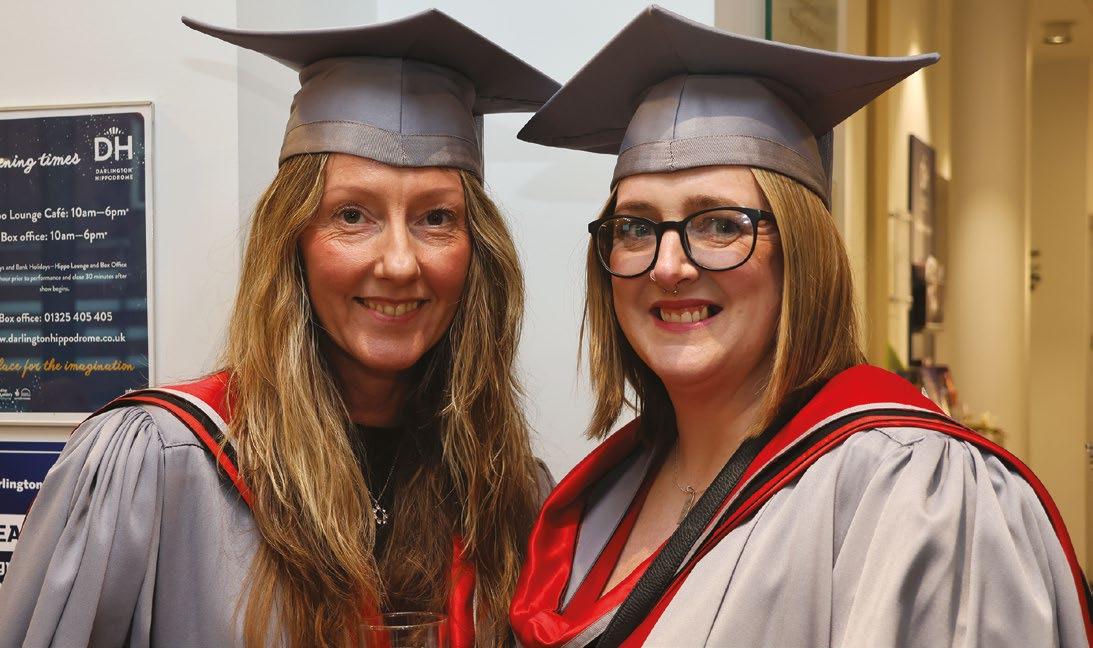
Course key: Examining Body | Attendance | Weeks | Duration | Level
Level 5 Diploma In Cognitive Behavioural Therapeutic Skills and Theory (CBT)
CPCAB | PT | 34 Weeks | 1 Year | Level 5

Access to HE Diploma - Humanities & Social Science
AIM | FT | 34 Weeks | 1 Year | Level 3
You need to be 19+ and you must have obtained our Level 4 Diploma in Therapeutic Counselling or its equivalent.
If you do not have previous qualifications in English you will be advised to study Functional Skills English.
It may be advisable for you to do GCSE mathematics and English if you do not have these qualifications at C grade or above as an additional qualification, as some universities may request these.
On the day of interview you will undertake maths and English assessments to assess your eligibility for the programme.
You must be 19 years or older to start this course.
This qualification is intended for candidates who want to develop CBT skills and theory as an integral part of their professional counselling work. It is designed to enhance the employability of counsellors in organisational settings and as independent practitioners by giving them a solid grounding in CBT skills and theory.
CBT is one of the NICE recommended psychological therapies and counsellors with CBT skills are often favoured above those without in multidisciplinary psychological therapy teams especially the Increasing Access to Psychological Therapy (IAPT) teams.
Access to HE Diploma (Humanities and Social Science) is a nationally recognised qualification with common requirements relating to the description of student achievement.
The course is a credit-based, graded qualification and requirements relate to both the award of credit and to the award of grades.
In order to obtain the full Access Diploma you will need to obtain 15 credits at L2; these credits are obtained from common core units.
In addition you will need to obtain 45 credits at level 3 from humanities/ social science units.
Attendance: Three days a week: Tuesday, Wednesday and Thursday. (subject to change).
Common core units
• Mathematics
• Study skills Humanities/Social Science units
• English language
• Sociology
• History- social and cultural development
• Social policy and welfare
• Psychology Modules can be subject to change.
A case study which is externally set and marked by the awarding body. You could progression to top up degree or work in Talking Therapies England.
You will be assessed through a wide range of assessments, this includes written assignments such as essays and reports, presentations, tests, group work and activities.
The course is designed to allow progression into Higher Education.
Access to HE DiplomaHealth
AIM | FT | 34 Weeks | 1 Year | Level 3
If you do not have previous qualifications in English you will be advised to study Functional Skills English. It may be advisable for you to do GCSE mathematics and English if you do not have these qualifications at C grade or above as an additional qualification, particularly if you are considering a career in midwifery. On the day of interview you will undertake maths and English assessments to assess your eligibility for the programme. You must be 19 years or older to start this course.
If you are 19+ and looking for a highly rewarding career as a nurse, midwife, physiotherapist, radiographer, and other health related professions we have the perfect course for you to get you on your way and with an advanced learner loan, any fees you pay will be written off when you graduate – so you’ll get this course for free! Why not get in touch and find out more – your future is closer than you think!
Access to HE Diploma (Health) is a nationally recognised qualification with common requirements relating to the description of student achievement. The course is a credit based, graded qualification and requirements relate to both the award of credit and to the award of grades. In order to obtain the full Access Diploma you will need to obtain 15 credits at level 2; these credits are obtained from common core units. In addition you will need to obtain 45 credits at L3 from health units.
Attendance: Three days a week: Monday, Tuesday and Wednesday or Tuesday, Wednesday and Thursday 9.15am-3.30pm each day.
Common core units
• Mathematics
• Study skills
• Health units
• Human biology
• Health promotion
• Humans against disease
• Professional practice
• Psychology Units can sometimes change.
If you don’t have the relevant English Language grade, you will study Functional Skills at L2, alongside this qualification. Please ask the tutor at interview for further details.
You will be assessed through a wide range of assessments, this includes written assignments such as essays and reports, presentations, tests, group work and activities.
The course is designed to Allow learners the opportunity to progress into Higher Education in the Health pathway. TU course fees are payable to Teesside University and details of fees can be found on the Teesside University website www.tees.ac.uk. All courses are subject to viable numbers. Darlington College course fees are payable to Darlington College. Registration and membership fees may apply. All fees are per year. All courses are subject to viable numbers.
Course key: Examining Body | Attendance | Weeks | Duration | Level
Course Entry
AIM | PT | 34 Weeks | 1 Year | Level 3
GCSE English and maths at grade C/4 or above. Equivalents are not acceptable. On the day of interview you will undertake maths and English assessments to assess your eligibility for the programme. You must be 19 years or older to start this course.
If you are 19+ and looking for a highly rewarding career as a nurse, midwife, physiotherapist, radiographer, and other health related professions we have the perfect course for you to get you on your way and with an advanced learner loan, any fees you pay will be written off when you graduate – so you’ll get this course for free! Why not get in touch and find out more – your future is closer than you think! Access to HE Diploma (Health) is a nationally recognised qualification with common requirements relating to the description of student achievement. The course is a credit-based, graded qualification and requirements relate to both the award of credit and to the award of grades.
In order to obtain the full Access Diploma you will need to obtain 15 credits at level 2; these credits are obtained from common core units.
In addition you will need to obtain 45 credits at level 3 from health units. This course is run over 2 evenings a week (evenings – they are Tuesday and Wednesday 5-8.45 pm – these will be confirmed at interview) from September for one year.
Common core units
• IT
• Study skills
• Health units
• Human biology
• Health promotion
• Humans against disease
• Professional practice
• Psychology
Units can sometimes change If you don’t have the relevant English Language grade, you will study Functional Skills at level 2, alongside this qualification. Please ask the tutor at interview for further details.
You will be assessed through a wide range of assessments, this includes written assignments such as essays and reports, presentations, tests, group work and activities.
The course is designed to Allow learners the opportunity to progress into Higher Education in the Health pathway
Course
Foundation Degree in Criminology and Public Services*
*pending approval
TU | FT | 30 Weeks | 2 Years | Level 5

A typical offer is 48 tariff points. However, the entry criteria is based on your ability to succeed and can be demonstrated in a variety of ways including: a range of L3 qualifications (NVQ 3, BTEC Award, A Level). You can apply for an Accreditation of Prior Learning, with previous industrial experience taken into account.
This course provides you with a recognised qualification which enhances your opportunities for potential employment within the criminal justice system, including roles such as policing, prison and probation service, legal and other criminal agency roles, both in the public and private sector.
The course will enable students to develop the knowledge, professional, transferable and practical skills in the discipline of Criminology and how this impacts upon the public services.
Modules for this course may include research, self analysis, criminal behaviour, forensics and policing. There may be optional visits and trips throughout the course, that could be chargeable, however costs will be kept to a minimum. You will be given advance notice of these taking place. The programme has been designed to reflect the combination of theoretical and practical research and study skills that will provide the platform for future careers.
The emphasis in Year 1 is on the application of knowledge, skills and understanding, use of conventions in the field of study, use of analytical skills, and selection and organisation of information.
The course assessment strategy has been designed to meet the educational aims, learning and teaching strategy, and course specific learning outcomes. As such, the assessment strategy heavily features a group work component embedded in modules.
Assessments have also been designed to address the transferable and professional skills aspects of the course through activity that requires writing for different audiences, engagement with aspects of digital media, as well as presentations and group work. This is supplemented by traditional forms of assessment including essay writing and examinations. The assessment strategy is in line with course benchmarks and standards for social science qualifications.
The course is designed to allow learners the opportunity to progress into Higher Education BSc (Hons) Criminology, BSc (Hons) in Professional Policing, BSc (Hons) Crime and Investigation.
Course
BA (Hons)
Therapeutic
Counselling (Top-up)
TU | FT and PT | 40 - 80 Weeks | 1 or 2 Years | Level 5

An NQF Level 5 Foundation degree in Counselling or an equivalent qualification.
Any candidate who has already completed a research study as part of a different degree programme at level 5 or above and who has a NQF level 4 Diploma in Counselling may be considered for entry onto the programme.
Due to the nature of the programme candidates will need to provide written references from two sources. One of these should be an academic reference with the other being their clinical advisor in order to demonstrate their appropriateness to undertake and cope with the academic requirements. Levels of maturity and commitment to the course and professional development will be evaluated from reference material and during the interview process. The BACP Ethical Framework for Good Practice supports equality of opportunity whilst recognising responsibility and change as an ongoing process. During the application process the counselling team will be referring to the ethical principles of counselling and the course fitness to practice policy to promote open and honest dialogue.
Because this course is taught at Darlington College we are not accepting applications from international students requiring a Student Visa. When applying through UCAS, make sure that you indicate your point of entry as Year 3.
A Therapeutic Framework for Working with Diversity:
This module will prepare you to work in a diverse, multi-cultural and multi-ethnic society. You are introduced to the relationship between working within a framework of antidiscriminatory practice, applying a theoretical base and integrating knowledge of ethical and legal responsibilities to client work. You reflect on your personal experience and issues around your practice as a counsellor when dealing with complex situations. You will develop your skills and reflective abilities in relation to responding to personal, moral, ethical and legal dimensions within the therapeutic relationship.
Client Issues in Therapeutic Practice introduces you to the theoretical concepts associated with diverse client issues and consider different theoretical responses to a range of client issues, linking theoretical knowledge to practice. The focus will be to consider the most appropriate approach to use when dealing with specific issues and concerns.
Counselling Research introduces you to the relationship between theory, research and practice through consideration of a range of research methods appropriate to counselling. You develop an enhanced ability to critically evaluate research papers and articles, skills in research design and the confidence necessary to conduct a small scale empirically-based research study. You will write a dissertation on an aspect of counselling of particular interest to your practice. Once a proposal has been agreed you will be assigned a dissertation tutor for regular tutorial support. The topic must have a clear relevance to the work of the counsellor and will be based on a small scale piece of field research.
Theory and Practice of Group Counselling introduces you to the competencies required for working in therapeutic groups. It does not provide training to work as a group therapist but instead highlights the complexities of working therapeutically with groups. You examine basic elements of the group process, theoretical approaches to group counselling, integration and application. You consider group leadership including recognising diversity in groups, ethical and professional issues, and stages in the development of a group, psychodynamic, cognitive behavioural and person-centred perspectives of group work, goals of counselling groups and the evolution of a group.
To achieve the BA (Hons) Degree in Therapeutic Counselling candidates need to both demonstrate a high level of academic competence and the ability to think critically about their own counselling practice. This is achieved through a variety of written academic assignments, oral presentations, observation and reflection of practice together with a research dissertation exploring a topic relevant to their practice.
Possible progress would be on to postgraduate degree courses. Successful candidates may also wish to pursue British Association for Counselling and Psychotherapy accreditation.
TU course fees are payable to Teesside University and details of fees can be found on the Teesside University website www.tees.ac.uk. All courses are subject to viable numbers. Darlington College course fees are payable to Darlington College. Registration and membership fees may apply. All fees are per year. All courses are subject to viable numbers.
FdSc Outdoor Coaching & Leadership
TU | FT | 60 Weeks | 2 Years | Level 5

Full, completed Level 3 study in a related discipline such as Outdoor Education. Applications will be considered from students with alternative academic background providing they can provide evidence of experience in, and a passion for, the outdoors.
GCSE Grade 4 or higher in Maths and English.
The Foundation Degree in Outdoor Coaching & Leadership aims to support the development of coaches and leaders in the outdoor industry, through a carefully constructed suite of modules spanning two years on a fulltime basis. The programme will cover a range of subject matter common to all outdoor coaching and leadership environments, ranging from coaching theory to sports science, applicable at recreational and performance levels. The selected topics will supplement and embellish key aspects of National Governing Body (NGB) syllabi, encouraging analytical approaches using the latest research. Through the implementation of such themes to practical settings in a range of disciplines, including paddlesport, climbing, navigation, and mountain biking, learners will develop a solid understanding of the strengths and limitations of theory, along with the ability to critique their performance as a practitioner, leader and coach. The programme aims to empower learners to continue with their personal growth in the industry, through NGB awards and qualifications, and take ownership of their professional development. Access to entry-level outdoor qualifications will form a critical part of the learner’s journey, from relative dependency to independent autonomy.
Formal written assignments, group and individual presentations, case studies, practical skills tests, timed examinations.
Outdoor Industry working in Outdoor Centres, Selfemployed, Freelance. Bespoke provision for special populations.
BSc Applied Sport & Exercise at TU. Top up year in Outdoor Coaching & Leadership TBC.

Thursday 20 March 2025, 5.30pm-7.30pm
Monday 23 June 2025, 3.30pm-6.30pm
Thursday 16 October 2025, 5.30pm-7.30pm
Tuesday 18 November 2025, 5.30pm-7.30pm
Darlington College, Central Park, Haughton Rd, Darlington, DL1 1DR